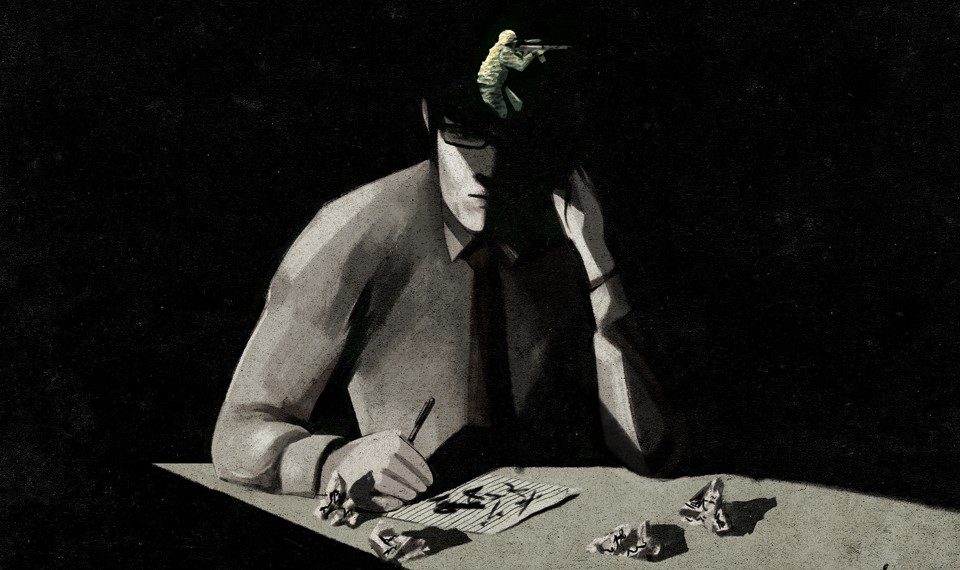Community, Leadership, Experimentation, Diversity, & Education
Pittsburgh Arts, Regional Theatre, New Work, Producing, Copyright, Labor Unions,
New Products, Coping Skills, J-O-Bs...
Theatre industry news, University & School of Drama Announcements, plus occasional course support for
Carnegie Mellon School of Drama Faculty, Staff, Students, and Alumni.
CMU School of Drama
Monday, November 27, 2017
Finding Your Creative Voice Again After Combat
The Atlantic: When I came home from my first deployment to Iraq, readjusting was literally impossible for me. I was a 33-year-old Army combat officer and I could no longer feel or see beauty in anything. And while I didn’t know how to leave the destructive path I was on, I also couldn’t stand to crush the hearts of my wife and children anymore. So, I temporarily moved out of my home and slept on various couches, more concerned with drinking than eating. When I would sit down to write, like I had done my entire life before deploying, I’d come up with nothing but blank pages. I had lost a lot of myself on the battlefield, it turned out. Large, significant pieces of who I was had been killed off somewhere in the desert, missing in action, never to come home.
Subscribe to:
Post Comments (Atom)

3 comments:
This article leaves me speechless. It not only tells the tale of a man who felt the need to serve in the military but it also looks at how it affected him as an artist. Everyone knows war is always bad but its these stories that really explain just how bad war is. Someone who was once an artist became lost and enveloped by the darkness. Luckily, he found his art again but even his art was still changed. The darkness of war influenced him to write about it. His previous artist side created the focus on darkness surrounding it and made to seem almost evil but just black, pure black. It is amazing to read this and not only experience some sort of feeling from it but to understand, just a little, how war takes away a part of someone and fills the new-found void with an evil black like feeling. This story is not only important as most people don’t know the side of war this article portrays but it also shows the power of art and value it has in our lives.
This was an incredibly beautiful and moving article to read. Stories of soldiers with PTSD after war experiences struggling to live their daily lives are not uncommon, but the story of an artist who temporarily lost his voice and direction is one that is often not shed light on. One of my all-time favorite books, The Things They Carried by Tim O'Brien, tells the experiences of soldiers in the Vietnam war and the physical trinkets and objects they carried in their pockets to remind them of home, as well as the emotional burdens they bear after living the war. This article reminds me of these stories as it describes his life of struggling to reconnect with his inner self and relocate his love for art he once carried before going to Iraq. One of my favorite parts of the article was the author's realization that it takes both lightness and darkness to create art-- that he now had the ability to understand the darkness and acknowledge it as an intrinsic piece of himself, but not become consumed by it.
Wow, Christopher Combest's story that he tells in this article was so insanely moving. I don't think that this is the kind of story that is told often enough, and I am very glad to have stumbled upon it here. I think the most important part of Combest's story is the theme of transition and change. Any artist, no matter their background, goes through change at one point in their life, and because of the creativity that they already have, this change or transition, I think, often shows through in their work. The quote from the article that I think speaks the most to this idea is when Combest writes, "When I would sit down to write, like I had done my entire life before deploying, I’d come up with nothing but blank pages. I had lost a lot of myself on the battlefield, it turned out". This realization is important, because by the end of his story, Combest knows that this is not actually true. Just because the way you approach or gain creativity is different from before, doesn't mean you have lost your artistry, but that instead you are growing as a person and an artist.
Post a Comment